Their near-fatal incident in early September was widely covered by the Australian media.
Russian adventurers Evgeny Kovalevsky and Stanislav Beryozkin of the Russian Ocean Way expedition were among three crew rescued by the Australian Maritime Safety Authority (AMSA) after their inflatable boat was attacked by cookiecutter sharks off Cairns.
The passing carrier, Dugong Ace, picked up the crew of the sinking vessel, before transporting them to Brisbane.
This was not a stand-alone episode in over two years of sailing.
In March, international media outlets reported on the same adventurers being rescued in the Pacific.
At the time, they encountered a storm that damaged their vessel’s steering when they were 1,600 kilometres west of Chile.
Unable to make the necessary repairs, the crew issued a Mayday signal, and the nearby bulker, Sounion, with a crew of Filipino and Ukrainian nationals, came to their rescue.
Who are they and why an inflatable boat?
The expedition, ‘On the Path of Russian Circumnavigators’ set sail on 1 July 2021, a few months before Russia’s full-scale invasion of Ukraine.
On board were Mr Kovalevsky and Mr Beryozkin, both from Siberia, who have since visited various countries on their expedition over the two-year period.
Their ground coordinator, Yulia Kalyuzhnaya told SBS Russian she handles organisational matters from Russia and occasionally joins them at different points around the world.
“Stanislav came up with the idea of a circumnavigation expedition on an inflatable catamaran,” Ms Kalyuzhnaya said.
“Evgeny and I liked the idea of completing the world’s first continuous circumnavigation expedition. Previous expeditions were partial, sometimes with breaks of several years.”
“For this [expedition], we devised several educational and other projects, secured funding and received support from the Presidential Grants Foundation,” she added.
The Presidential Grants Foundation allocates grants from the president of Russia on a competitive basis for socially significant projects of non-profit organisations.
Following Russia’s invasion of Ukraine, SBS Russian understands that there has been a spike in commissioned projects aimed at supporting "patriotic education" and military training for Russian youth.
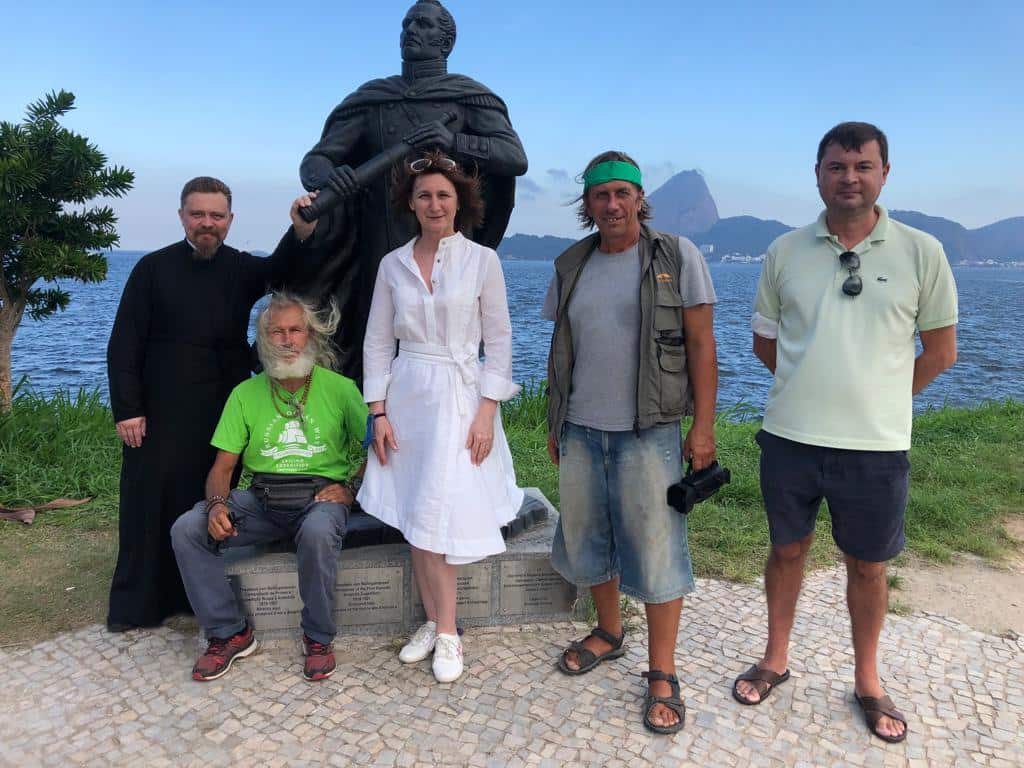
This expedition received the Russian equivalent of A$131,606 in 2020, according to the Presidential Grants Foundation website.
The grant application listed the project’s goals as spreading “current and positive information about Russia among foreign citizens” and “forming a positive image of Russians among foreigners”.
The second grant, amounting to approximately A$151,410, was approved in early 2023.
“The vast majority of residents in foreign countries, [...] form their opinion about Russia based on media headlines. These are almost always aimed at demonising Russia, the ‘Russian world’, and at using Russophobia as a new element of those countries’ culture,” the grant application explained.
“Unlike in Russia, where the government promotes critical thinking among the population to combat fake news, residents of foreign countries simply do not have the opportunity to obtain accurate information about the true ideals and values of the Russian Federation,” the application stated.
At the time of application, the sailors noted that they will use Russia's ‘soft power’ for image-building. They told SBS Russian that they have already conducted more than 120 people-to-people diplomacy events, reaching over 40,000 foreigners.
“[The goal] is to show foreign people and sailors that people from Siberia — Russians — are doing what nobody else has done,” said Mr Kovalevsky.
“I’m a patriot of Russia. I believe that it is prestigious to be Russian.
The fact that Russians sail around the world on an inflatable condom is very prestigious. No one else does that.Evgeniy Kovalevsky, leader of the expedition “On the path of Russian circumnavigators”
Ms Kalyuzhnaya claims that following such meetings, the attitudes of foreigners toward Russia “changed”.
“Fifteen countries have already been covered by the expedition and all those people want to visit Russia... Their perception of Russia has completely changed,” she said.
The group has conducted several meetings with students and community members in Australia, including one with the Russian ambassador.
In addition, the expedition claims to have an educational mission.
These sailors conduct “Lessons from the Ocean” for Russian students. In 2022, this project received the Crystal Compass Award from the Russian Geographic Society (RGS).
The RGS Board of Trustees is chaired by Russian President Vladimir Putin. Russia’s defence minister, Sergey Shoigu, is its president.
At a recent meeting of Trustees of RGS, Vladimir Putin explained, that it has always actively participated in “the fate of Russia” and that it “continues to gather purposeful, selfless people, who literally expand the boundaries of knowledge, present history, culture, traditions, natural wealth of Russia".
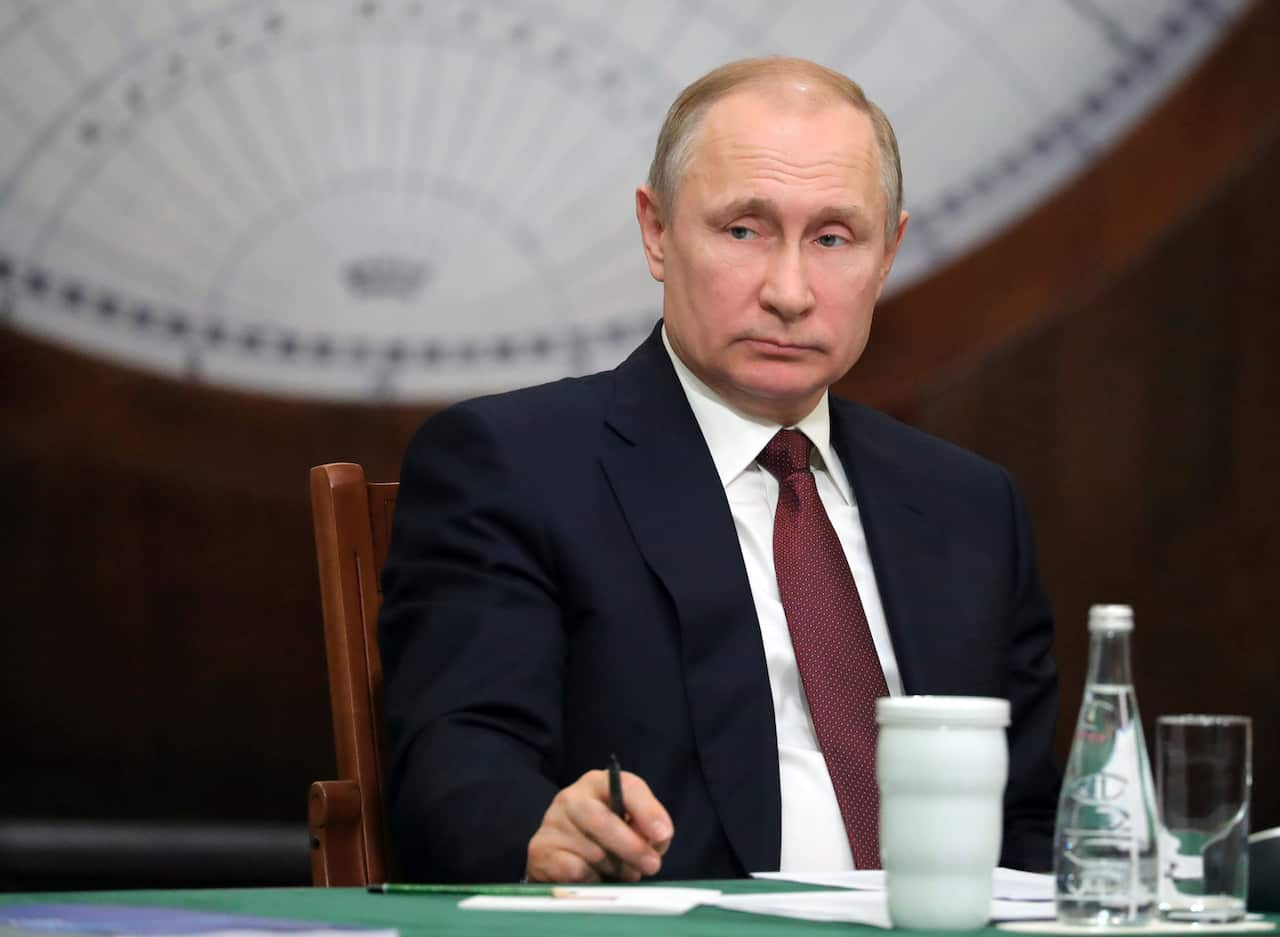
War, sanctions and cookiecutter sharks
When Russia launched its full-scale invasion of Ukraine in February 2022, the sailors were in Brazil.
Due to the economic sanctions imposed on Russia by several countries, their bank cards were cut and they also lost satellite connection, as mentioned on the expedition’s website.
The sailors admitted that at that time, the future of the expedition “became quite precarious”.
In an interview with the state-controlled Russia-1, where the host referenced “sanctions pressure from unfriendly countries,” Mr Kovalevsky noted that even in the midst of a complex political situation, they “continue their mission of people’s diplomacy".
“We decided to get new Union Pay payment system cards in Russia and have them delivered in Brazil,” Ms Kalyuzhnaya said.
“I also brought an antenna for the Automatic Identification System for the crew."
This navigation system provides important information about a vessel to neighbouring vessels as well as coastal authorities automatically.
However, the sanctions were not the most significant challenge faced by the sailors.
They have encountered life-threatening situations three times and lost their vessel twice.
I have already saved them three times.Yulia Kalyuzhnaya, ground coordinator
“The first time, while crossing the Atlantic Ocean with just 600 miles short of Brazil, their mast broke," Ms Kalyuzhnaya explained.
"I contacted the Brazilian rescue centre, the navy and our consulate helped us. Sixty litres of petrol was delivered to them so that they could sail."
The second incident ended more dangerously as the crew lost their trimaran — the vessel they were sailing in.
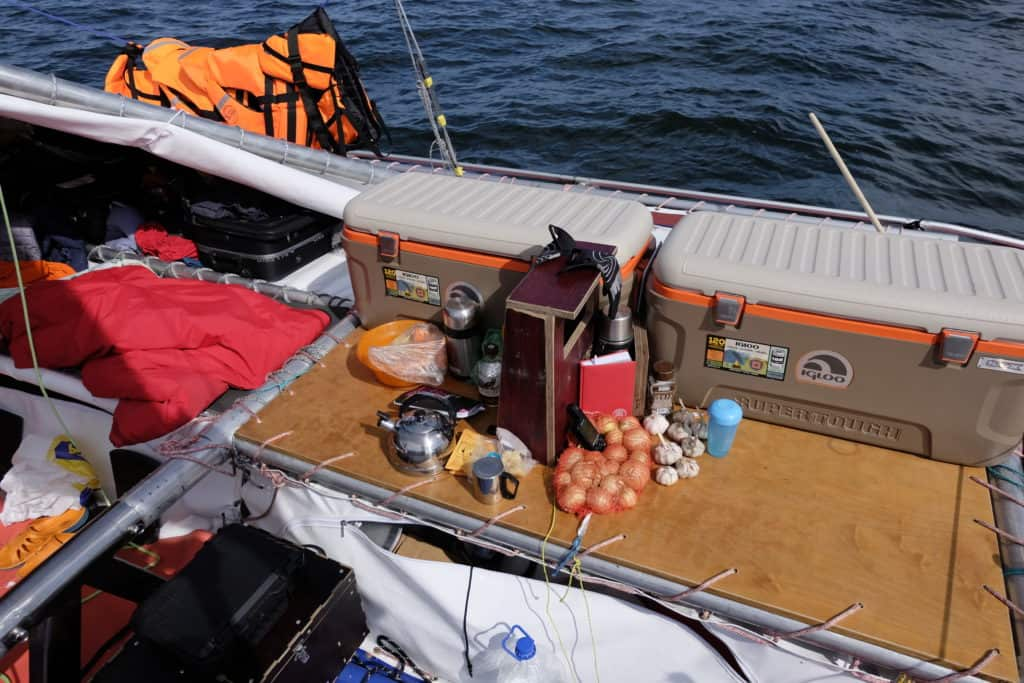
“Just 800 miles from the island of Tahiti, the steering mechanisms failed and they lost control of the boat,” Ms Kalyuzhnaya added.
“We conducted a rescue operation. A bulk carrier approached them and they were saved. They towed the trimaran, but two hours later, a storm came and it was torn away.”
The crew of the Sounion bulk carrier, which came to the aid of the Russian sailors during the second incident, included Ukrainians.
The captain of this vessel was originally from Mariupol, a Ukrainian city in the Donetsk region, now occupied by Russia.
In an interview with Radio Liberty, Mr Beryozkin described their interaction with the Sounion captain.
The captain said he's from Mariupol and had to leave for Kyiv in 2015. We didn't ask anything else, because it's a bad topic.Stanislav Berezkin
The third rescue mission took place on their way to Australia and made headlines in local news outlets.
The success of this rescue operation greatly depended on the swift actions of Natasha Arens, a migration agent from Cairns.
Ms Arens is known in the local community for her willingness to help.
Since the war started, Ms Arens has been actively assisting Ukrainian refugees with settling in Australia and finding jobs.
Ms Kalyuzhnaya got in touch with Ms Arens and asked for help, notifying her that the vessel of the expedition had been attacked by cookiecutter sharks.
At that time the damage wasn’t massive and the sailors were expected to get to the coast on their own.
But at night, the boat issued an SOS signal.
Ms Arens was in touch with Ms Kalyuzhnaya and passed on the coordinates of the boat to the AMSA.
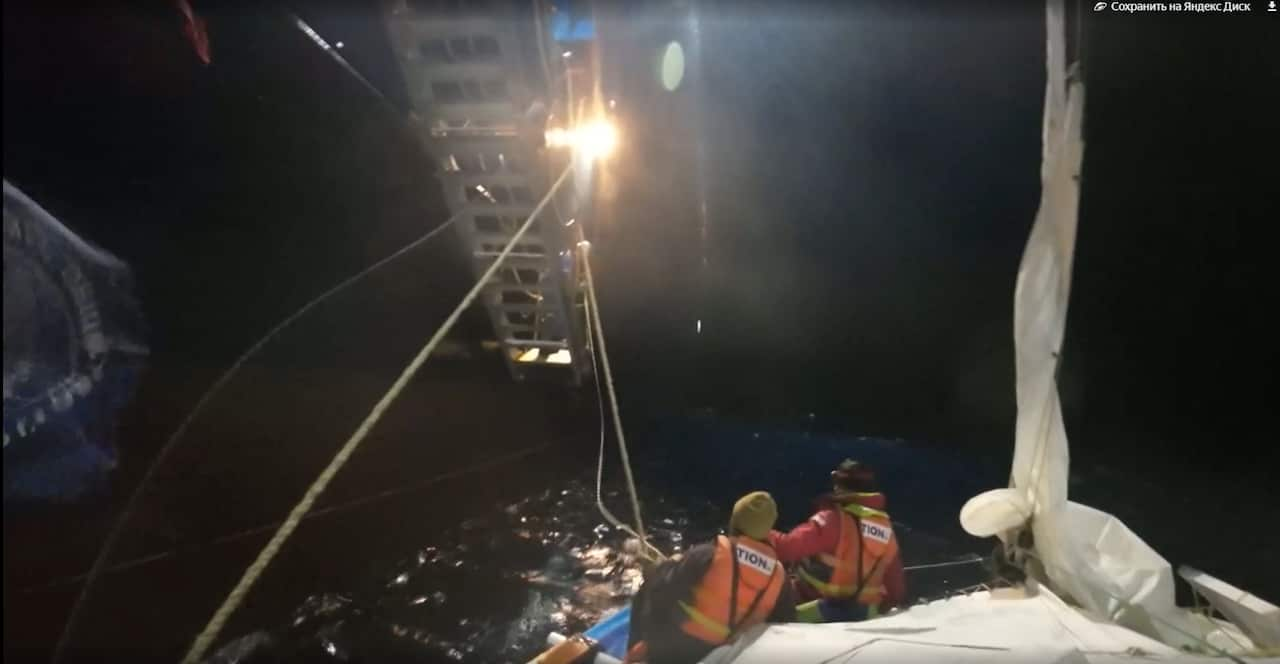
The sailors were eventually rescued by the crew of the passing Dugong Ace.
Mr Kovalevsky expressed his gratitude to the Australian authorities for their prompt action.
“Fortunately, a Panamanian cargo ship approached,” he said.
This was the most dangerous, critical situation, we could have died.Evgeny Kovalevsky, expedition leader.
True to the mission of the expedition, Mr Kovalevsky held a lecture for the crew of the Dugong Ace on their way to Brisbane, similar to those he’s held in other 12 countries before.
“There were 32 Filipinos on board. We organised a meeting and told them about our expedition,” he said.
“I’m sure these people will respect Russia until the end of their lives and will tell their children what good people Russians are.”
He said that the sailors were “amazed” by what they heard.
They said: 'You Russians are incredible.' I think it's the highest praise for Russians.
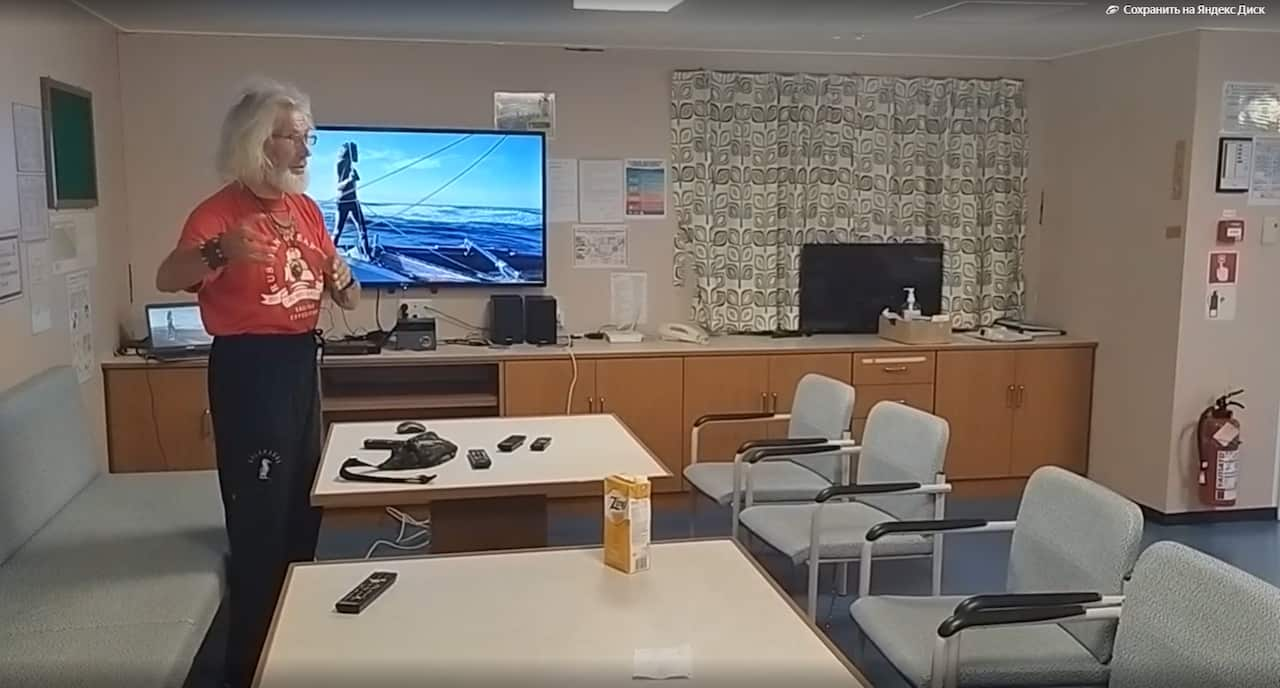
"This inspires us. We're not just saying, 'Oh, we're patriots.' We go out there, we survive, and show it to the people abroad."
New boat, old expedition
Even after losing the boat in the ocean heavily damaged by sharks, the Russian sailors say they plan to continue their expedition.
Now they need a new vessel and additional funding to get on with their journey.
A fundraising campaign has been launched on GoFundMe and there are calls for help amongst the local Russian-speaking Facebook groups.
I'm a terminator. Our task is to continue the expedition.Evgeniy Kovalevsky, leader of the expedition “On the path of Russian circumnavigators”
Ms Kalyuzhnaya has now arrived in Australia.
“We need a boat on which we can complete all our projects and tasks ahead. We still have grant terms to fulfil."
“The entire country is behind us now, following us. Of course, we must continue," Ms Kalyuzhnaya signed off.
